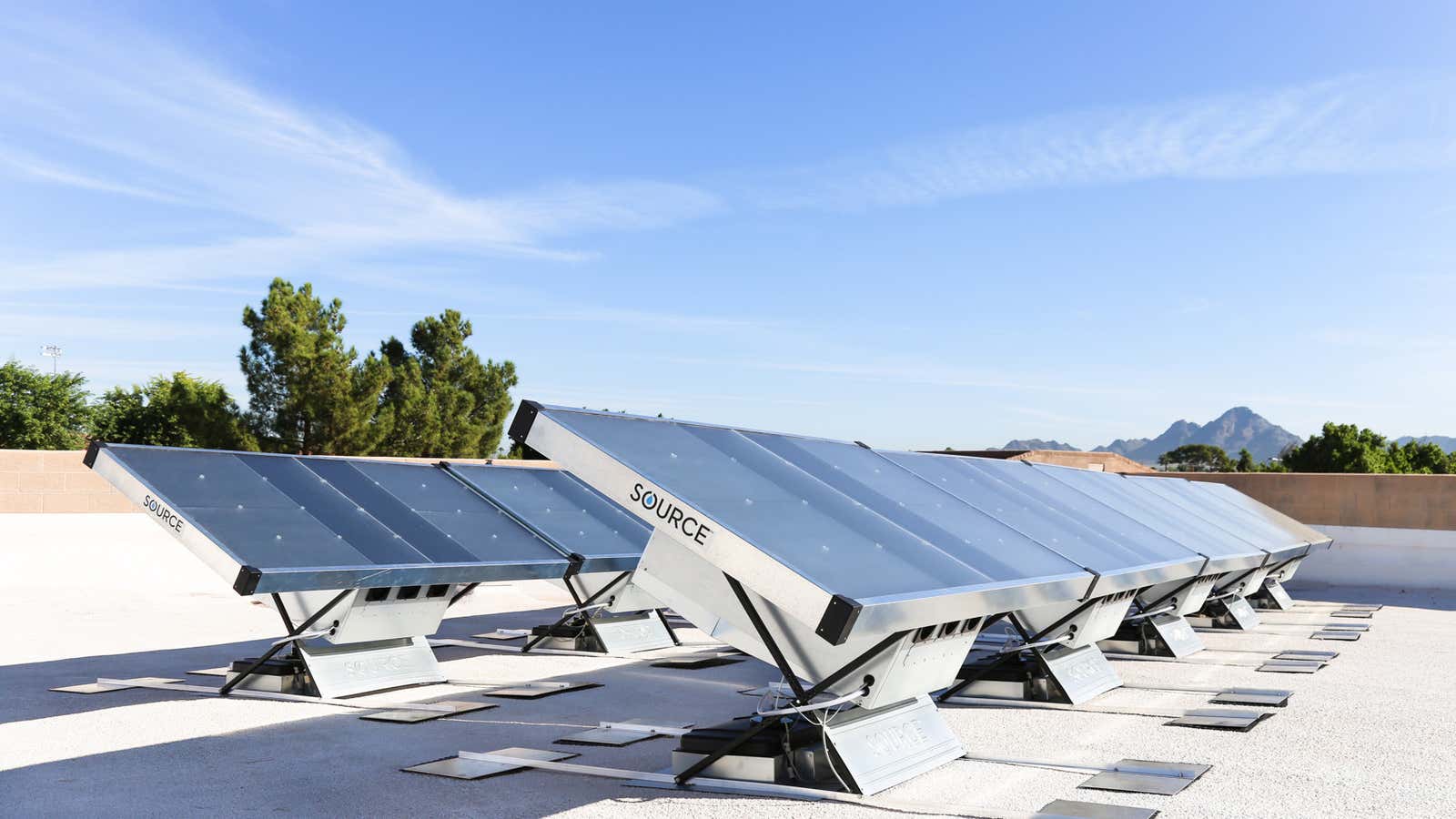It’s not often that the world’s richest people get together, agree on a goal that’s for the public good, and then set about finding ways to achieve it. But that’s what Bill Gates has achieved with Breakthrough Energy Ventures (BEV), which aims to invest $1 billion into radical energy startups capable of drastically cutting global emissions. The fund draws on the resources of billionaires like India’s Mukesh Ambani, Amazon’s Jeff Bezos, former New York City mayor Michael Bloomberg, Virgin’s Richard Branson, Alibaba’s Jack Ma, and SoftBank’s Masayoshi Son.
In June, Quartz broke the story of BEV’s first two investments: Form Energy, which is developing two new types of battery chemistries capable of storing weeks and months worth of energy, respectively, and Quidnet Energy, which is developing a technology to replicate the benefits of hydropower by pumping water into subsurface shale formations.
We can now report, for the first time, a full list of the other companies that BEV is funding and will publicly acknowledge. (Some companies in its portfolio prefer not to be named, says Carmichael Roberts, BEV’s head of investing, while BEV plans to announce others at a later stage.)
- QuantumScape: A startup building an all-solid-state battery, which many experts believe is key to the future of electric cars.
- Commonwealth Fusion Systems: A firm working on a nuclear-fusion reactor that uses high-temperature superconductors and aims to be the first fusion system to produce net-positive energy. (Read more about CFS in this Quartz feature.)
- Pivot Bio: A biotech company developing a microbial solution that can replace nitrogen fertilizers, reduce nitrogen runoff, and eliminate the related production of nitrous oxide—a greenhouse gas 300 times as powerful as carbon dioxide. (Read more about Pivot Bio in this Quartz story.)
- CarbonCure: A firm that is injecting recycled carbon dioxide into concrete to increase its strength compared to conventional concrete. The result is cost savings and carbon reductions for the concrete industry. (Read more about low-carbon cement and concrete in this Quartz feature.)
- Fervo Energy: A startup rethinking geothermal power with the help of modern computational models and horizontal-drilling technology. Fervo hopes that the technology it is developing will cut the cost of geothermal power by some 50%.
- DMC Biotechnologies: A company tailoring microbes to produce high-value chemicals, including biofuels. DMC claims to have technology that can cut costs and save time needed to scale up biological synthesis.
- Zero Mass Water: A startup selling specialized panels that use solar power and batteries to pull water from the air. The goal is to reduce the amount of energy needed to access clean drinking water without geographical limitations.
It’s a betting game
Gates has invested in a handful of energy companies before. In the process, he’s learned that energy startups are not like software companies. These startups progress slowly and at great expense, earning them the moniker “tough tech” because they work on difficult problems that require fundamental breakthroughs. Investors need to be willing to put forward not just money, but also support for scientists transitioning to becoming entrepreneurs or first-time founders learning to run a company.
“We are a unique fund with investors who are patient and flexible,” says Rodi Guidero, executive director of BEV. “Our goal is to find the companies that will have the greatest impact on accelerating the energy transition and help them in whatever way we can.”
To help him find those companies, Guidero draws on an in-house group of scientists, technologists, and entrepreneurs, along with a network of 140 academic institutions and large corporations. They provide expertise on the vast range of technologies that BEV is interested in.
To be eligible for BEV’s money, a startup needs to showcase a scientifically sound technology that has the potential to reduce annual global greenhouse-gas emissions by at least 500 million metric tons. Global emissions currently measure about 40 billion metric tons a year.
Portfolio thinking
BEV says the companies went through rigorous rounds of checks before receiving funding ranging from $200,000 to $20 million, depending on their stage of development and needs. The initial list has companies that are both young (Form Energy was formed last year) and fairly mature (CarbonCure has been around for 10 years).
BEV won’t share the individual sum each company received, but the total investment thus far comes to $100 million. It has acknowledged that $1 billion is not that much to invest in the energy space. Consider, for example, the fact that the latest nuclear-fusion reactor being built has a price tag of $22 billion. But BEV hopes to leverage its partners and media attention to help fill funding and other gaps.
To some extent, that’s already starting to happen. Breakthrough Energy Coalition, a sister non-profit to BEV, convinced 15 countries, including the US, France, and India, to double government spending on energy technologies. And a few weeks ago, Form Energy and Quidnet Energy both received $4 million and $3.3 million in grants, respectively, from the US Department of Energy’s advanced research projects division. Quidnet acknowledged that the media attention the company received as a result of BEV’s investment also made it easier to recruit good talent.
BEV’s focus is on funding projects that will reduce emissions from five sectors: electricity, transportation, agriculture, manufacturing, and buildings. Each of the companies on the initial list fits into one or more of those buckets.
Though the portfolio may cover a large range of technologies, it is limited in other respects. The startups announced by BEV so far are all North American, and most of their leadership is also largely white and male.
“It’s easier to be helpful at home when starting out,” Roberts says. He adds that the portfolio will be revealed over time to be more diverse and international as the names of each company BEV has invested in become public.
